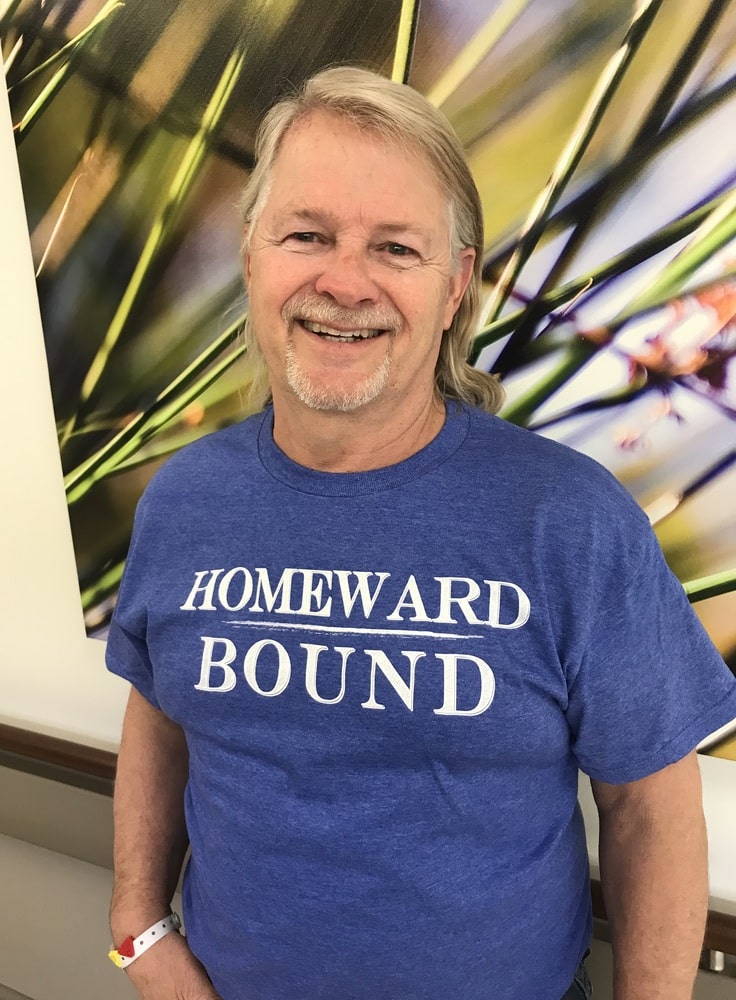Richard “Rick” Busbea

Richard “Rick” Busbea has lived a very active lifestyle. He is twice retired from the United States Air Force, where he worked in information management. Since his retirement, Rick has worked part-time at ACE Hardware. He enjoys golf, gardening, and riding motorcycles. Rick has many projects he is working on around the home, including his newest project, restoring a 1929 Model A that his father passed on to him. In addition, he sings and plays guitar professionally in Sedona and the surrounding area.
One day, Rick went in for a routine visit with his cardiologist for a baseline assessment of his heart condition and underwent a stress test and ultrasound. The cardiologist determined that he needed to go to the Cath Lab for a procedure on his heart. Rick underwent percutaneous intervention of the heart and received a medication for conscious sedation called Versed. Unfortunately, he had an adverse reaction to this medication, and the physician decided to keep Rick in the hospital overnight.
Because he experienced confusion and visual changes, Rick underwent an MRI of his head. The MRI revealed that he had suffered multiple small infarcts, determined to be strokes. “When I woke up, I was blind and could not see anything; this lasted for about one, one-and-a-half days,” Rick said, recalling the challenges he suddenly faced. “I didn’t know who I was or where I was. I had poor word-finding ability and hallucinations. Eventually, my eyesight was returning, but with left-field cut deficits. [For example,] when someone was trying to hand me a cup of water, I could see the cup of water but could not see the person handing me the water. It is a really odd feeling to see objects floating towards you, and you know that someone is handing it to you but cannot see them.”
Though Rick felt his deficits were resolving quickly, he knew he was not yet at his baseline. Rick humbly reports having a higher-than-average IQ, so though he may have appeared normal to most, he knew he was not close to his baseline. He and his wife, Tracey, did not feel safe with him returning home in this condition and were hopeful that he would be admitted to Rehabilitation Hospital of Northern Arizona (RHNA) for concentrated therapies.
Rick and Tracey chose RHNA after doing research online. They viewed the website for RHNA and saw that the facility had earned The Joint Commission’s Gold Seal of Approval for Stroke Rehabilitation. These national certifications are voluntary and reflect the hospital’s commitment to providing safe and effective care to patients who have suffered strokes. RHNA achieves the best possible results for patients by utilizing best practices and a patient-centered, rehabilitative approach.
Located in Flagstaff, RHNA is committed to helping patients return home with as much physical and cognitive independence as possible through individualized treatment plans. “We knew we did not want to go to Phoenix and wanted to stay close to home,” Rick stated. “With the facility being close to Sedona, where we live, we knew that it would make traveling easy for Tracey. We were impressed by our research on the facility, and it was an easy transition to come to RHNA.”
“All the therapists were great to work with,” Rick said. “Kelli (OT) really motivated me. Lexi (RN) reminded me of a family friend. Dr. B. (Balouch) is a terrific doctor and so personable. Jon, the CEO, is so friendly and treats everyone like a small business owner would, getting to know each [patient].”
“Nobody is above their title at RHNA, and it shows. I remember accidentally hitting the call light, and Kyler, the director of nursing, answered my light immediately. Everyone was just so willing to help in any way they could.”
As Rick reflected on what influenced his recovery most, he stated wholeheartedly, “God and prayer.” With tears in his eyes, he added, “I am so humbled by the huge support I have had. There were over 200 people on Facebook praying for my recovery, and it worked. I define success as ‘making an impact in whatever you’re doing.’ I realize that I have made an impact and people care that I get better. That’s the bottom line. These tears are not because I am sad; [they are] because I am so touched to know that I have made an impact on others. I not only feel the care from people I personally know, but I feel that same care from the staff, too.”
Having completed his inpatient rehabilitation stay, Rick looks forward to what lies ahead.
“I am looking forward to getting back home to my wife, Tracey, and my 13-year-old Yorkie, Mr. Max.” Rick also has a lot of unfinished projects at home that he would like to return to. “I will get to start performing again at Vino Di Sedona, as I promised my wife I would take a break.”
Rick left RHNA with the following parting words for anyone who finds themselves in a similar situation as his: “Believe in the power of prayer. Don’t be afraid to ask for [what you want]. So many people don’t and are afraid to ask. And remember to work your butt off; that’s a big part of this [recovery].”


